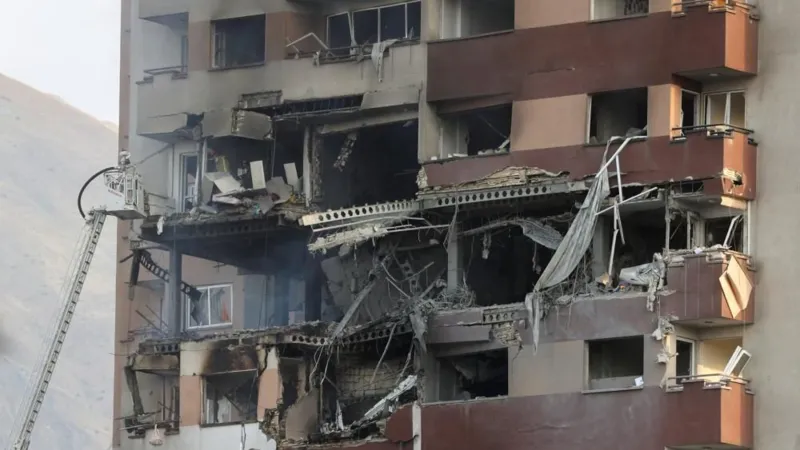Explosions Rock Tehran as Israel Targets Iran’s Nuclear Program
Early Friday morning, a series of explosions shook Iran’s capital, Tehran, as Israel launched a large-scale military operation targeting nuclear and military sites across the country. Dubbed Operation Rising Lion, the strikes focused on Iran’s nuclear infrastructure and high-ranking military officials.
Israel Confirms Strikes on Dozens of Iranian Nuclear and Military Targets
According to the Israeli military, the operation struck “dozens of military targets, including nuclear facilities in different areas of Iran.” Notably, an explosion was later confirmed at Iran’s Natanz nuclear enrichment facility, a key site in the country’s uranium development efforts.
The International Atomic Energy Agency (IAEA) confirmed the Natanz site was hit but stated that radiation levels remain unchanged.
Iran Breaches Non-Proliferation Obligations: Global Tensions Escalate Following IAEA Resolution
Top Iranian Military Leaders and Nuclear Scientists Reportedly Killed
Iranian state media reported the deaths of several top commanders and nuclear scientists in the Israeli strikes. Among those confirmed killed are:
- Hossein Salami, Commander-in-Chief of Iran’s Islamic Revolutionary Guard Corps (IRGC)
- Gholamali Rashid, Commander of Khatam-al Anbiya Central Headquarters
- Mohammad Bagheri, Chief of Staff of Iran’s Armed Forces
Additionally, at least six nuclear scientists were reported dead, including:
- Fereydoon Abbasi, former head of Iran’s Atomic Energy Organization
- Mohammad Mahdi Tehranchi, involved in Iran’s nuclear weapons program
- Abdulhamid Minouchehr, nuclear engineering head at Shahid Beheshti University
- Ahmad Reza Zolfaghari, nuclear professor at Shahid Beheshti University
- Amirhossein Feqhi, nuclear professor at Shahid Beheshti University
Ali Shamkhani, a senior adviser to Supreme Leader Ayatollah Ali Khamenei, was seriously injured, according to reports. The BBC has not independently verified these claims.
Iran Responds with Drone Attack on Israel
In retaliation, Iran launched more than 100 drones toward Israel. The Israel Defense Forces (IDF) reported that their air defenses have begun intercepting the incoming drones outside Israeli airspace. A state of emergency has been declared in Israel amid heightened military readiness.
Iran’s Foreign Ministry condemned Israel’s actions, labeling them “acts of aggression” and warning that the Iranian armed forces “will defend the country’s sovereignty with full strength.”
Netanyahu Declares Operation Aimed at Preventing a Nuclear-Armed Iran
Israeli Prime Minister Benjamin Netanyahu stated that the goal of Operation Rising Lion is to dismantle Iran’s nuclear capabilities, which he described as a “clear and present danger” to Israel.
“In recent months, Iran has taken steps to weaponize enriched uranium,” Netanyahu said. “If not stopped, Iran could produce a nuclear weapon within months.”
Netanyahu also thanked former US President Donald Trump for previously confronting Iran’s nuclear ambitions.
United States Denies Involvement in the Attacks
US Secretary of State Marco Rubio stated that the United States played no role in the Israeli strikes and emphasized that the top priority is the safety of American personnel in the region. Former President Trump has yet to comment.
Other international leaders expressed concern. Australia’s Foreign Minister Penny Wong warned that the escalation could destabilize an already volatile region.
Why Iran’s Nuclear Program Remains a Global Flashpoint
Iran claims its nuclear program is intended for civilian energy purposes. However, the IAEA and Western powers remain unconvinced. This week, the IAEA board declared Iran in breach of its nuclear non-proliferation obligations for the first time in 20 years, citing failures to disclose undeclared nuclear materials and suspicious enrichment levels.
The IAEA also reported that Iran possesses uranium enriched up to 60% purity, nearing weapons-grade levels—enough, experts say, to potentially build nine nuclear bombs.
Conclusion: A Dangerous Escalation with Global Implications
The Israeli strikes mark a significant escalation in Middle East tensions and come at a time of increased scrutiny over Iran’s nuclear ambitions. With top military officials and nuclear scientists reported dead, and Iran responding with drone attacks, the risk of a broader conflict looms large.
As the world watches, the need for diplomatic de-escalation is urgent. The consequences of further military action could destabilize not just the region—but global peace efforts as well.
Let me know if you’d like a short version for social media or a featured snippet version for SEO ranking.

